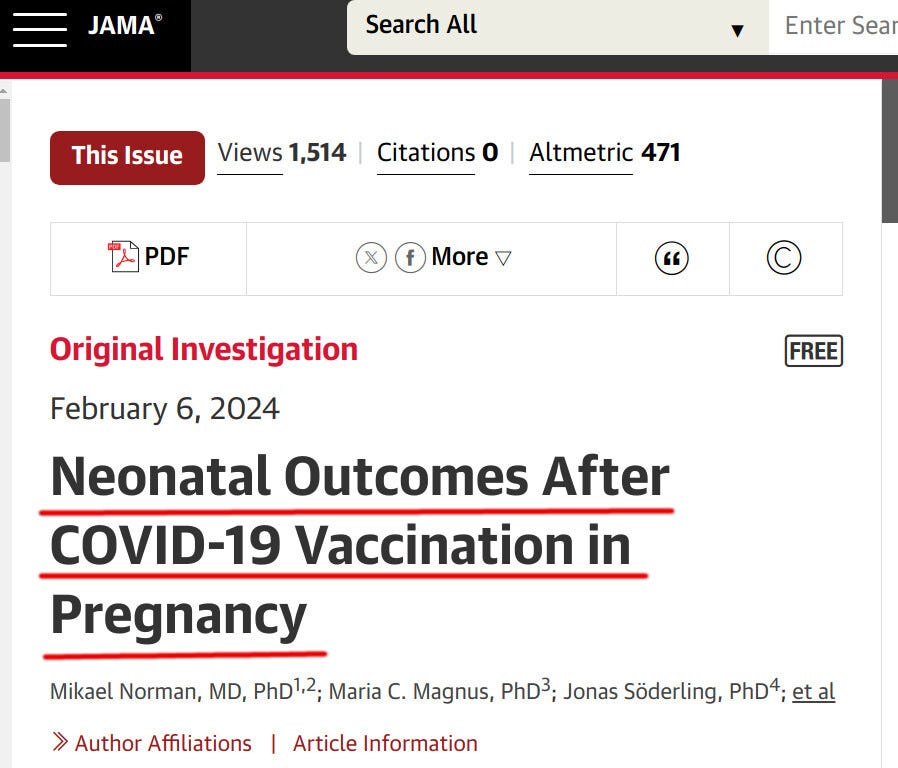COVID Vaccines Are Most Dangerous in the First Trimester of Pregnancy, Study Suggests

Swedish and Norwegian newborns: postnatal outcomes depend on vaccination trimester
A new study was published in JAMA yesterday.

Its objective was to prove that COVID vaccines are “safe for pregnancy.”
Meaning In this large population-based study, vaccination of pregnant individuals with mRNA COVID-19 vaccines was not associated with increased risks of neonatal adverse events in their infants.
Indeed, authors show that infants born to vaccinated mothers experience fewer adverse outcomes compared to unvaccinated mothers:
Results Of 196 470 newborn infants included (51.3% male, 93.8% born at term, 62.5% born in Sweden), 94 303 (48.0%) were exposed to COVID-19 vaccination during pregnancy. Exposed infants exhibited no increased odds of adverse neonatal outcomes, and they exhibited lower odds for neonatal nontraumatic intracranial hemorrhage (event rate, 1.7 vs 3.2/1000; adjusted odds ratio [aOR], 0.78 [95% CI, 0.61-0.99]), hypoxic-ischemic encephalopathy (1.8 vs 2.7/1000; aOR, 0.73 [95% CI, 0.55-0.96]), and neonatal mortality (0.9 vs 1.8/1000; aOR, 0.68 [95% CI, 0.50-0.91]).
The authors admit:
It is unlikely that mRNA COVID-19 vaccination during pregnancy directly reduces neonatal mortality, although others have suggested that such a protective effect is biologically plausible.12 The vaccine does not seem to pass the placenta or induce placental inflammation, and could not be traced in cord blood.25,26 The current study’s results could not elucidate the mechanisms that explain why infants of vaccinated individuals had lower risks of some outcomes including mortality. Unmeasured confounding due to vaccinated individuals being healthier may have contributed to the lower neonatal morbidity and mortality associated with COVID-19 vaccination during pregnancy.
I will show that the data provided in the study, including subgroup and trimester analysis, suggests that Covid vaccines given to pregnant women may be dangerous to fetuses if the mothers were vaccinated during the first trimester.
Sensitivity and Trimester Analyses
This study of infants born in Sweden and Norway during the pandemic includes valuable and hard-to-find data:
- Sensitivity analyses show subsets of mothers, for example, vaccinated mothers who did not have COVID-19 during pregnancy.
- Breakdown by the trimester of COVID vaccine exposure.
When looked at together, the data mentioned above raises serious questions about Covid vaccine safety in pregnancy.
Those who tout the benefits of maternal COVID vaccination often state that vaccines prevent COVID-19, which is dangerous to fetuses. This study has a sensitivity analysis that belies this theory.
First of all, COVID vaccines did NOT meaningfully reduce infections during pregnancy, as Table 1 shows:

The sensitivity analysis data shows that the infants whose mothers avoided COVID-19 during pregnancy have similar outcomes to all infants (including the ones whose mothers had Covid during pregnancy):

Therefore, “vaccine protection against infection” does not reduce the relative risk of adverse outcomes. Looking at the subset of mothers who did not have Covid shows that infections have nothing to do with the relative risk of those adverse outcomes.
The authors suggest that “unexplained confounders,” sometimes described as the “healthy vaccinee effect,” may be the reason for the reduced relative risk of vaccinated vs. unvaccinated outcomes.
Disturbing Difference Between First and Third Trimester Vaccinations
Imagine a perfectly useless but harmless substance: a saline shot or a sugar pill. A treatment of that kind, given to pregnant mothers, would not result in disparate outcomes based on the trimester of exposure. Stating the same in scientific terms, the relative risk of adverse events experienced by newborns whose mothers were given a harmless substance would not depend on the trimester of exposure.
Why, then, do newborns whose mothers were vaccinated in the first trimester of pregnancy (when major organs form) experience approximately 50% greater rates of adverse postnatal events than those born to mothers vaccinated in the third trimester?
Take a look at this:

Rates of almost all negative infant outcomes (circled in blue) are worse for first-trimester infants compared to third-trimester infants.
Can we perform a statistical test on some of these differences to see whether the disparity in the outcomes in the two samples could arise due to pure chance? Look at the above outcome, “neonatal thrombocytopenia,” highlighted in red.
The proper statistical test for this is called a “two-proportion Z-test”:

The data shows that infants exposed to the vaccine earlier (in the first trimester of pregnancy) are more likely to have thrombocytopenia after birth. P = 0.00001 suggests that the difference did not occur due to chance.
The only explanation that I can personally muster is that Covid vaccines, given in the first trimester, somehow interfere with fetal development and make thrombocytopenia (and a host of other outcomes) more likely to happen.
The same effect appears when looking at “all adverse outcomes.” See supplement:

Infants exposed in the first trimester have 0.68/0.49 – 1 = 39% greater risk of having any adverse outcome.
How can a “safe vaccine” that “does not affect pregnancy” make the first trimester of exposure more dangerous?
A similar finding was recently seen in another study: the risk of neurodevelopmental disorders was similarly higher for first-trimester exposure compared to third-trimester:

Summary
A sub-analysis of pregnancies that avoided COVID-19 shows that the “reduction in adverse outcomes due to vaccines” is likely due to confounding, not reduction in infections.
At the same time, the unexplainable disparity between infants exposed in the first trimester and infants exposed in the third trimester suggests that the Covid vaccines negatively affect fetal development.
What do you think? Is there a pattern suggesting that Covid vaccines are not safe for pregnancy? Let us know what you think – and feel free to disagree with me!
One of our country’s most important freedoms is that of free speech.
Agree with this essay? Disagree? Join the debate by writing to DailyClout HERE.




